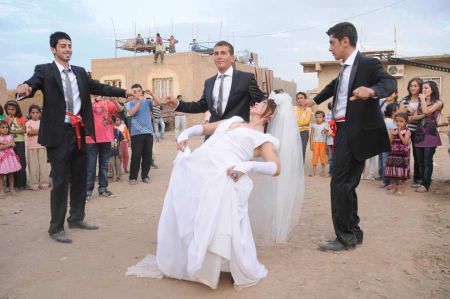Sparkling wine for everyone - provocations of Şükran morality?
- Written by Portal Editor
Since the police operations against the so-called Gezi protests in 2013, art from and in Turkey has had a real problem. Everyone now expects art to at least partially address political issues.
This was particularly evident during the Istanbul Biennale, which was somehow political but ultimately failed to convince either as a statement or artistically. In other words: When social freedoms are restricted, art's autonomy from real political events also suffers. The pressure of a system to “behave in conformity” rarely produces great artistic works.
Şükran Moral's works have been presented in many international exhibitions, including MACRO in Rome, the Victoria and Albert Museum in London, the Stedelijk Museum in Amsterdam and the Bergen Kunstmuseum in Norway. In her performances, the Turkish artist Şükran Moral works with men's privileges, which are currently being manifested again in Turkey. But that has little to do with provocation.
Şükran Moral was born in 1962 in the small town of Terme on the Black Sea. Her family was very conservative. So her father denied her further education after school. Şükran resisted him, first working in a tailor shop, then attending secondary school and finally studying at the Ankara Art Academy. In 1989 she moved to Rome, where she graduated as a visual artist six years later.
Şükran Moral's "Wedding for Four"

A curator, Claudia Giannetti, highlighted provocation in the catalogue as a central moment in Şükran Moral. But Şükran Moral is not a member of “Femen”, she is not a political activist. It changes reality in a symbolic act. In order to create new things that are self-evident, you have to ensure that they are accepted by an environment.
Moral also achieves this in her performance Hamam from 1997. The Edith Russ House shows it as a three-channel installation. The artist is seen in a traditional Turkish bathhouse that is reserved for men. She sits on hot, steaming tiles in the middle of a larger group of them. Similar to the three-way wedding, the artist does not transform into a man here either. Rather, she claims the powers and habits of men as women. She has her body scrubbed, fed fruit and refilled with champagne. The images running in parallel on three monitors reinforce each other. You see sweating naked bodies, then close-ups of hands, mouths and breasts. The scene becomes ecstatic. Şükran Morality does not provoke. Everyone behaves completely normally. It is the beauty of this new normal that is provoking.
Please read as well:
